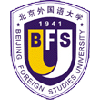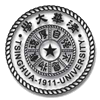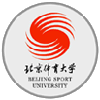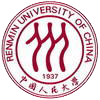Peking University
Founded in 1898, Peking University (PKU) was originally named
the Imperial
Peking University was among the first universities in China to
develop
Peking University has also placed great importance on academic exchange and international cooperation with foreign universities, signing agreements with more than 200 universities in 50 countries and regions; thus cultivating a worldwide network for academic exchange and collaboration. It promotes a wide scope of cooperation with leading universities worldwide. It has joint programs with Harvard University and the University of Hawaii at Manoa in the US for training American Sinologists. Peking University has also co-sponsored intensive training programs pertaining to Chinese society and culture with a number of renowned universities, such as Oxford and Cambridge in the UK, Waseda and Keio in Japan, and Stanford and Chicago in the US. In 2003, Peking University initiated a regular undergraduate student exchange program with the University of Hong Kong and the Hong Kong University of Science & Technology. In addition, Peking University has collaborated with Moscow State University in Russia to establish a joint Graduate School to provide graduate education to both Chinese and Russian students in all kinds of disciplines. Peking University encourages international exchange at all levels and different schools and departments play an important role in academic exchange and cooperation. Fruitful international exchange further enhances understanding and mutual cooperation between Peking University and its partner institutions. At present, Peking University has 46,074 students, among whom 4,400 are international students from 80 countries around the world studying various degree programs at the university, while a few hundred are learning Chinese at Peking University annually.
Peking University is a comprehensive university comprised of multiple disciplines including: Natural Sciences, Humanities, Social Sciences, Medicine, and Information & Engineering. The University has 30 colleges, 12 departments, and 216 research centers. The university offers a large spectrum of undergraduate programs and the most PH.D programs in China: 93 undergraduate programs, 199 postgraduate programs and 173 doctoral programs. The university also plans to further broaden curricula and offer all forms of continuing education. Each year, hundreds of academic seminars and lectures are offered to students. These are also all kinds of festivals, such as science and technology, culture, and sports, forming some of the highlights of the cultural life on campus. Various other activities like Scientific and Technological Innovations Week, Enterprising Business Projects Competition, and "Challenger Cup" contest all reflect the students' pioneering spirit and their eagerness to grasp the pulse of the modern era. All classrooms are air-conditioned and equipped with modern aural comprehension training facilities. Peking's Centennial Commemorative Hall, located near the Audio & Video Education Centre, is often used by teachers and students to hold meetings, give stage performances, and show Chinese and English films.
The University has 4,574 full-time faculty members, of whom 1,188 are professors and 1,503 are associate professors. Many professors have achieved high academic standing and world renown. There are also a host of younger and creative teachers working at the teaching and research forefront. As an increasingly international community, Peking University attracts about 20,000 visits annually. Among them are predominantly university presidents and eminent scholars. Presidents and Vice Chancellors from renowned institutions such as Harvard, Yale, Oxford, Cambridge, Munich, Moscow, Tokyo and so forth, have made their footprints at the Peking University. Based on its outstanding tradition and international reputation, Peking University has also become an international forum for heads of foreign statesmen, social celebrities and business leaders. Over fifty world famous statesmen, directors of international academic organizations, and famous scientists and Nobel laureates have been conferred with honorary doctoral degrees or professorship, thereby raising the international profile of Peking University. Peking University has made reforms in its teaching methods by revising its teaching practice with the aim of cultivating students' practical abilities and creative powers. As a result, teaching principles of basic courses have strengthened, course content has been enriched and renewed, and favorable conditions have been created for students to fully develop themselves. Peking University energetically advocates the learning concept of "being diligent, rigorous, realistic and creative". Peking University has a long history in training international students to learn the Chinese language and culture. Its International College of Chinese Language Studies enjoys a high reputation in China and abroad, especially for its superb faculty and rich experience. The College for Chinese Language Studies is responsible for teaching Chinese language and culture to international students. This college has over 70 faculty members of which there are 4 professors, 18 associate professors, 30 plus teachers, lecturers and assistant lecturers, and administration staff. All the teaching staff are graduates from Peking University's Chinese Language & Literature Department. In fact, about seventy percent of the teachers hold MA degrees, and thirty percent hold Ph.D degrees. All teacher staff have certificates issued by China's Ministry of Education for Teaching Chinese as a Second Language. They are extremely knowledgeable about the Chinese language and culture and have much experience teaching international students. The Chinese language and culture programs offer a very flexible curriculum designed with the best interest of the participants in mind.
Library The Peking University Library is the oldest university library in China. It has a total floor space of 51,000 square meters and houses more than 5.3 million books, the largest collection within China's university libraries. The Peking University is home to many rare books and rubbings. There are over 1.5 million volumes of antique books, 170,000 volumes of rare books, and several thousand precious books and extremely rare editions. In fact, the Peking University library has one of the largest collections of stone rubbings in the country. Possessing high relic and artistic value, these rare books and rubbings are also of great academic value for the preservation of and research on traditional culture. The Peking University library also has an impressive digital library system. This system provides the library's online catalog, international pool search, subject updating and paper search and citation. Additionally, a new wing, called Disc and Network Search Section, has been added to the library. This area offers over a hundred workstations and large capacity CD-ROMs, including a collection of over 270 academic discs and various foreign network databases and e-journals. Recreation Facilities There are various sports facilities on the Peking University campus including a gym, indoor and outdoor swimming pools, sports field with track, football ground, and dozens of basketball, volleyball, tennis, and badminton courts, which students can use. Pool tables, table tennis and rock climbing practice areas are also available in the Sports Activities Center. Besides these, there are also a couple of Stadiums where events, including sports competition and other performances, are sometimes held. In front of the foreign student dormitories, there are also badminton, tennis, volleyball, and basketball courts. PKU facilities are open to all international students, though some facilities, like the swimming pool, require a usage fee. Students can rent equipment by presenting their student ID card. Laundry There are many places on the Peking University campus that offer laundry services, from dry cleaning, bulk laundry, to mending and more. There are also coin-operated washing machines inside student dorm buildings and campus laundry mats. Money & Banking The Industrial Commercial Bank of China and the Agricultural Bank of China are both conveniently located on the Peking University campus. Off-campus, but close to PKU, are the Bank of China, China Construction Bank, and Bank of Communications. Business hours are generally from 8:30 am to 6:00 pm, Monday to Saturday. These Banks accept credit cards and travelers' cheques, provide deposits, remittance and currency exchange services. You can also exchange currency at some bank locations using the following credit cards: American Express, MasterCard, Visa, Diner's Club, JCB, Million and Federal Card. Please note that not all ATM machines in Beijing accept foreign ATM cards. The ATM machines in major shopping areas, such as Wangfujing and Xidan, will accept most international ATM cards, but the ATM machines located within the Peking University campus may not. You may also apply for a domestic ATM card if you open a Chinese bank account. Medical Care There is a University hospital located in the northwest area of the Peking University campus. Students can see doctors at the hospital with their student cards. The registration fee is 3 RMB for an ordinary case and 5 RMB for an emergency case. Each individual shall pay for his/her own medicine prescription. Extra payment shall be made for inviting doctors for house calls. Patients suffering from serious illness can go to Peking University's Third Hospital, the Chinese-Japanese Friendship Hospital or the ISOS Clinic where special outpatient services and wards are provided for foreigners. The ISOS clinic has a pharmacy that supplies many western drugs and medications. Food & Groceries There are more than a dozen cafeterias and restaurants on the Peking University campus that offer a wide variety of cuisine, including Chinese, Western, Korean, Japanese and more. Many eating-places are also within short walking distance from the campus. A meal generally ranges from 5 - 25 RMB per person depending on what and where you eat. There are also many restaurants off campus offering Chinese, Japanese, Korean and Western cuisines. The cost of eating at restaurants is generally a little pricier than eating at school cafeterias, but is still very affordable. In addition, restaurants have longer service times and have a greater variety of delicious foods to choose from. There is one large supermarket and a number of grocery stores on campus that sell basically everything you will need, from things to eat, drinks, stationery to daily items and other living necessities. Off-campus and within walking distance, is an array of stores, including chain grocery stores, computer stores, local shops, music stores, eyeglass shops, to clothing boutiques and more. Postal Services Students can send and receive packages at the post office located in Shao Yuan's Building Number 7, located within the foreign student dorm area. There is also a larger post office on the Peking University campus that handles all kinds of mail services, including selling of stamps and envelopes. Opening Hours: 10 am 每 4 pm, Monday 每 Friday
Peking University campus offers dormitory accommodation for international students. Accommodation may be based on single or double occupancy. The dorms are equipped with one or two single beds, desk and chairs, TV, telephone, internet access, refrigerator, private bathroom, air-conditioning and 24 hours hot water. The cost of outgoing telephone calls and internet connection where available is to be paid by students. Coin-operated washing machines in the dorm building are available for student use.
Peking University is located in Bejing's convenient Haidian District and is 38 kilometers away from the Capital Airport, 18 kilometers away from Tian' anmen Square and the Forbidden City, 3 km away from Summer Palace, 20 kilometers away from the Beijing Railway Station and 13 kilometers from the Beijing West Railway Station. From the airport to the university: 1 hour by car From the train station to the university: 30 minutes by car |

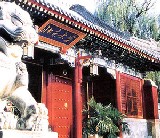 University of Peking. It was the first national comprehensive
university and the supreme administrative organ for education in
China at that time. The university's establishment marked the
beginning of China's modern history of higher education. In 1912,
after the 1911 Revolution, the Chinese government decided to further
promote higher education, and hence placed PKU at the top of the
agenda, with the intent of making it a world-class university.
Peking University has continually been a pioneer in the course
of China's progress towards modernization. Throughout its one
hundred year history, Peking University has emphasized diligence,
conscientiousness, truthfulness and innovation.
University of Peking. It was the first national comprehensive
university and the supreme administrative organ for education in
China at that time. The university's establishment marked the
beginning of China's modern history of higher education. In 1912,
after the 1911 Revolution, the Chinese government decided to further
promote higher education, and hence placed PKU at the top of the
agenda, with the intent of making it a world-class university.
Peking University has continually been a pioneer in the course
of China's progress towards modernization. Throughout its one
hundred year history, Peking University has emphasized diligence,
conscientiousness, truthfulness and innovation. 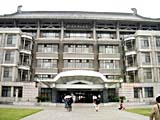 Peking University is a full-fledged international university with
a cultural flare. Landscaped with beautiful gardens and courtyards,
the campus is a friendly and comfortable place for international
students to practice their Chinese, join in the many student activities,
and make new friends from all over the world. With twenty-four
hour security, the campus is a safe place to be day or night.
The students at Peking University enjoy a rich and vibrant campus
life, enjoying a colorful array of activities for students to participate
in.
Peking University is a full-fledged international university with
a cultural flare. Landscaped with beautiful gardens and courtyards,
the campus is a friendly and comfortable place for international
students to practice their Chinese, join in the many student activities,
and make new friends from all over the world. With twenty-four
hour security, the campus is a safe place to be day or night.
The students at Peking University enjoy a rich and vibrant campus
life, enjoying a colorful array of activities for students to participate
in. 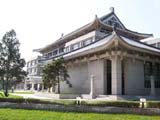 programs for international students, and has trained over
20,000 international students over the past five decades. With
a strong focus on education and transference of knowledge, Peking
University has become a major player in providing Chinese language
training and culture dissemination to foreign students. To raise
comprehensive quality and encourage students' independent thinking
and judgment, Peking University actively promotes educational reform,
constructs academic disciplines, and develops teaching materials.
programs for international students, and has trained over
20,000 international students over the past five decades. With
a strong focus on education and transference of knowledge, Peking
University has become a major player in providing Chinese language
training and culture dissemination to foreign students. To raise
comprehensive quality and encourage students' independent thinking
and judgment, Peking University actively promotes educational reform,
constructs academic disciplines, and develops teaching materials. 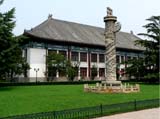 The guiding principle of the reforms is the aim to "strengthen
the foundations of knowledge, encourage cross-field learning, teach
students in accordance with their aptitudes, and bring out every
individual's potential." Peking University is building up
a targeted concept for quality education and lifelong learning,
with an emphasis on 21st century oriented curriculum and course
setup. It also strives to keep pace with the world's current educational
developments to bring in an international dimension for students'
training.
The guiding principle of the reforms is the aim to "strengthen
the foundations of knowledge, encourage cross-field learning, teach
students in accordance with their aptitudes, and bring out every
individual's potential." Peking University is building up
a targeted concept for quality education and lifelong learning,
with an emphasis on 21st century oriented curriculum and course
setup. It also strives to keep pace with the world's current educational
developments to bring in an international dimension for students'
training. 